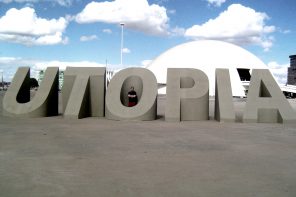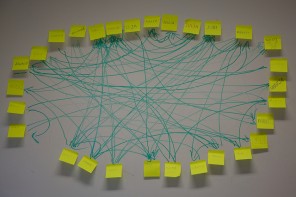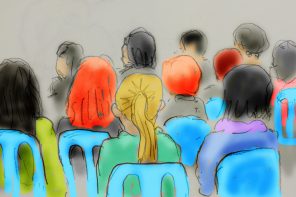For candidates on the job market, particularly ones focused on alt-ac positions, working in a library can seem enticing yet unattainable: on the one hand, the library is a familiar space; on the other, getting a job in a library often requires pursuing an additional degree, the MLIS. However, some positions in archives and special collections at universities ask for relevant experience in place of the MLIS, and these positions not only offer an experience similar to working in a library but also effectively leverage the research skills one learns in graduate school.
So it seems the problem of attaining an MLIS has been substituted with gaining additional work experience during graduate school. This leaves open the question of whether a humanities graduate student is qualified for work in archives and special collections. The long and short of it is yes! Archives often employ undergraduate students, and graduate students have the benefit of being experienced researchers, which makes them ideal candidates to organize materials for future scholars. I can offer some insight into my own experiences working at the archives and special collections in the Thomas J. Dodd Research Center at the University of Connecticut. My hope is to allay some apprehension about pursuing this career path, as well as to encourage others to take paid or volunteer positions as a means to build crucial experience while balancing the other (sometimes onerous) demands of being a graduate student.
For the past year and a half, I’ve been working at an entry-level position processing new acquisitions, as well as developing and revising finding aids for heavily used collections. During the academic year I usually work one day a week, and I work as many hours as the staff can stand me during the summers. All of this experience familiarizes me with the way special collections work and builds my network of contacts in the library community. Most of my work in the archives, and most entry-level work, involves paging (providing patrons with the materials they request) and processing collections.
Paging is an important yet fairly straightforward part of work in archives. Processing collections, however, reveals how the skills and training learned from years of work as a graduate student are transferable and marketable. I’m a medievalist by trade; however, the archives at UConn don’t carry a lot of materials relevant to my specific period of study, let alone extensive collections of medieval manuscripts. Instead, I’ve worked on collections ranging from early-twentieth-century children’s book authors to early-twenty-first-century avant-garde musical activism. At first I was intimidated by being asked to work on collections far outside my range of expertise. But once I started to get comfortable with the work, I began to see each task as a research project, and as graduate students we are nothing if not researchers par excellence.
The role of someone processing a collection is to balance preserving the physical arrangement of a collection dictated by its provenance with imposing an intellectual organization to help researchers find what they want when they consult the materials. One major part of the job, which is usually a lot of fun, is getting a handle on what is in a collection, whether it’s new to the archive or new to you as a processor. This usually involves going through the materials piece by piece, getting a sense for what is physically present, and speculating about threads that might connect the materials together. Sometimes that can be tedious, like combing through collected junk mail preserved in a collection’s correspondence. But more often than not, you attempt to reconstruct the logic behind the materials before you. The more intellectually curious you are, the more rewarding processing work in an archive can be. In my experience, the lion’s share of processing comes from creating the finding aid, an intellectual framework for accessing the materials of the collection. This is usually done electronically by entering the individual items that form groups of materials into an electronic database, which is then published as a finding aid for the public. The archives at UConn, for example, use a Web-based platform called ArchiveSpace.
Since you want to preserve the physical order of the collection as much as possible, the finding aid is where you can arrange materials to best assist the researcher. For instance, one might link a collection of personal correspondence from prison with contemporary circulating pamphlets on civil disobedience movements. The best part about having a graduate studies background while trying to create a finding aid for a collection is that you know what makes a researcher’s life easier, even if you know nothing of the content. Processing a collection requires you to consider the needs of a researcher and thus allows you to draw on your own extensive experience consulting materials for evidence. Biographical materials should usually be listed together in a finding aid because background knowledge is important to understanding the context of a personal collection. Correspondence might be easier to manage when handled chronologically or, if the correspondence is notable, organized by surname. Overall, it is a rewarding experience to experiment with organizing archival materials and to improve that organization when researchers consult the collections that you have helped arrange.
So if you appreciate the idea of hands-on work with diverse materials, consider working or volunteering in the archives or special collections of your university. These places may pounce on the opportunity to take on graduate students and to assign work whose intellectual engagement is commensurate with graduate students’ skill sets. In my case, it has turned what was initially a summer work opportunity into a major driving force behind my alt-ac interests.
 Patrick Butler is a doctoral candidate in medieval studies at the University of Connecticut. His primary research interests are in Middle English romance, paleography, and manuscript studies. In his dissertation, “‘And Sore Hem the Kings Blod / That It Schuld Be Spilt So’: The Resonance of Violence on Politicized Bodies in Fourteenth-Century English Romance,” he seeks to unsettle monolithic assumptions about bodily violence in romance in order to reimagine a genre usually regarded as “escapist” literature as an imaginative space for the exploration and confrontation of political anxieties. In addition to his graduate studies he works as an archival assistant at the University of Connecticut Archives and Special Collections in the Thomas J. Dodd Research Center.
Patrick Butler is a doctoral candidate in medieval studies at the University of Connecticut. His primary research interests are in Middle English romance, paleography, and manuscript studies. In his dissertation, “‘And Sore Hem the Kings Blod / That It Schuld Be Spilt So’: The Resonance of Violence on Politicized Bodies in Fourteenth-Century English Romance,” he seeks to unsettle monolithic assumptions about bodily violence in romance in order to reimagine a genre usually regarded as “escapist” literature as an imaginative space for the exploration and confrontation of political anxieties. In addition to his graduate studies he works as an archival assistant at the University of Connecticut Archives and Special Collections in the Thomas J. Dodd Research Center.







